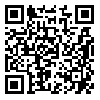Volume 6, Issue 21 (2018)
CFL 2018, 6(21): 226-251 |
Back to browse issues page
Download citation:
BibTeX | RIS | EndNote | Medlars | ProCite | Reference Manager | RefWorks
Send citation to:



BibTeX | RIS | EndNote | Medlars | ProCite | Reference Manager | RefWorks
Send citation to:
Rezaei H, Zaheri Abduvand I. Religious Identity in Bakhtiari's Proverbs. CFL 2018; 6 (21) :226-251
URL: http://cfl.modares.ac.ir/article-11-14990-en.html
URL: http://cfl.modares.ac.ir/article-11-14990-en.html
1- Associate Professor in Persian Language and Literature/ Payame –Noor University
2- Assistant Professor of Persian Language and Literature/ Shahre Kord University
2- Assistant Professor of Persian Language and Literature/ Shahre Kord University
Abstract: (5050 Views)
Proverbs are amongst the treasures that play an important role both in representing and internalizing religious identity, therefore, it is essential to analyze and scrutinize these proverbs in order to better understand religious culture of people. In the present research, the cognitive components of religious identity have been investigated through content analysis method in Bakhtiari's proverbs to show how the cognitive and received components of these components are reflected in the counterexamples and what is the function of this cognition? The issues of theology, resurrection, prophet hood, and Imamah, the practical commandments of religion, the Qur'an, religious places, and Qur'anic characters are reflected as the cognitive components of religious identity in the Bakhtiari expressions amongst which the most frequent encompasses the theology. Religious identity in these proverbs has both the psychological and socio- cognitive function. Thus, Individuals relying on God and the principles of prophecy and imamah retrieve the hope in their life and by reminding the resurrection and the glory of God and reform the ethical and social dilemmas.
Article Type: Research Paper |
Subject:
Popular literature
Received: 2017/08/15 | Accepted: 2019/04/27 | Published: 2019/04/27
Received: 2017/08/15 | Accepted: 2019/04/27 | Published: 2019/04/27
| Rights and permissions | |
 |
This work is licensed under a Creative Commons Attribution-NonCommercial 4.0 International License. |







